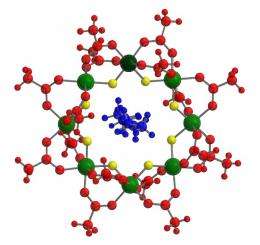March 21, 2012 feature
Researchers engineer molecular magnets to act as long-lived qubits

(�鶹��ԺOrg.com) -- Some physicists today are investigating the possibility of using molecular magnets as information storage units in future quantum computers. Molecular magnets are molecules whose magnetic moments prefer to lie along a particular axis with respect to the molecular structure. They have electron spin structures that can be magnetically tuned to more than one state and, at low temperatures, can retain this state even in the absence of a magnetic field, potentially allowing them to store information.
Now a team of researchers from the UK have demonstrated that the phase of quantum mechanical superpositions between the magnetic states can last for more than 15 microseconds, allowing their spin states to be repeatedly switched before they lose their information through decoherence. This finding adds to the evidence that molecular magnets may be useful as qubits, the components of a quantum computer.
The researchers, C.J. Wedge, et al., from the University of Oxford and the University of Manchester, have published their study on how to chemically engineer molecular qubits to increase their phase memory times in a recent issue of �鶹��Ժical Review Letters. Previously, the researchers achieved a phase memory time of 3.8 microseconds, and studies of other molecular magnet systems have yielded times on the 1 microsecond time scale.
“Phase memory time and coherence time are very similar concepts,” coauthor Arzhang Ardavan of the University of Oxford told �鶹��ԺOrg.com. “[Long phase memory time] means that it is possible to manipulate the qubit many times before the quantum information is lost. That is the greatest significance, but we were also pleased that it was possible to control the molecular structures precisely so as to determine the various decoherence mechanisms and to reduce them as far as we were able.”
In their study, the researchers focused on Cr7Ni molecular magnets, which they had previously shown to have coherence times that greatly exceed the 10 nanoseconds needed for single-qubit manipulations. Here, they have taken the next steps and investigated the specific sources of the molecular magnet's decoherence (nuclear spin diffusion and spectral diffusion), as well as how to optimize the structures to delay decoherence as long as possible.
To do this, the researchers compared different Cr7Ni structures by changing two key components, certain cations and ligands. They specifically investigated how well the different structures retained their spin states at low temperatures, as measured by the structures' phase-coherence relaxation time. The researchers found that optimally engineered Cr7Ni molecular magnets can have phase memory times exceeding 15 microseconds, which is several orders of magnitude higher than the time required for single-qubit manipulations, and significantly longer than previous demonstrations.
The researchers predict that the results will lead to the ability to manipulate quantum states within molecular magnet clusters. They plan to further investigate ways to manipulate molecular magnets in the future.
“We will examine various possibilities,” Ardavan said. “Our collaborators who work on the chemistry of these molecules are able to synthesize structures incorporating several coupled molecular magnets. We will work on simple multi-qubit algorithms using these kinds of molecules.
“Recently, it was proposed theoretically that electric fields could be used to manipulate the magnetic states of molecular magnets,” he added. “We are examining these possibilities experimentally.”
More information: C.J. Wedge, et al. “Chemical Engineering of Molecular Qubits.” PRL 108, 107204 (2012).
Copyright 2012 �鶹��ԺOrg.com.
All rights reserved. This material may not be published, broadcast, rewritten or redistributed in whole or part without the express written permission of �鶹��ԺOrg.com.


















